
One of French cinema's finest directors, Patrice Chéreau, died yesterday at the age of 68. Famous as a writer and director of both the screen and the stage, Chéreau made his film debut in 1975 with The Flesh of the Orchid (La chair de l'orchidée), an adaptation of British mystery author James Hadley Chase's sequel to No Orchids for Miss Blandish. The film starred Charlotte Rampling, Simone Signoret, Edwige Feuillère, Bruno Cremer, and Hugues Quester. Chéreau would subsequently re-team with Signoret in 1978 for his next feature, Judith Therpauve. He would come to prominence in the international film circuit with this third film in 1983, L'homme blessé, a gritty, sexually explicit tale of an eighteen-year-old boy (Jean-Hugues Anglade) and his infatuation with a drug-addicted hustler (Vittorio Mezzogiorno). Premiering in competition at Cannes that year, L'homme blessé launched the career of Anglade, who would work with Chéreau again in Queen Margot and Persécution, and awarded Chéreau and his co-writer Hervé Guibert the César for Best Original Screenplay.

His next film, Hôtel de France—which starred Valeria Bruni Tedeschi, Vincent Perez, Marianne Denicourt, Agnès Jaoui, and Bruno Todeschini among others—played in the Un Certain Regard section at Cannes in 1987, followed by Chéreau's participation in the Amnesty International-funded omnibus feature Contre l'oubli (Lest We Forget), alongside Jean-Luc Godard, Alain Resnais, Claire Denis, Chantal Akerman, and several others. His best-known film, Queen Margot (La reine Margot), played in competition at Cannes in 1994, winning the Jury Prize as well as the Best Actress prize for Virna Lisi. The lavish, violent costume drama was nominated for an Academy Award for costume design, a Golden Globe for Best Foreign Film, and received Césars for cinematography, costume design, and for three of its cast members: Isabelle Adjani, Jean-Hugues Anglade, and Lisi.

Chéreau returned to his queer roots in 1998 with the splendid Those Who Love Me Can Take the Train, an ensemble film surrounding the funeral of a beloved painter (Jean-Louis Trintignant). The film also starred Valeria Bruni Tedeschi, Vincent Perez, Pascal Greggory, Charles Berling, Bruno Todeschini, Roschdy Zem, and Dominique Blanc. Césars were given to Blanc for Supporting Actress, Éric Gauthier for Cinematography, and Chéreau for Direction. Chéreau made his English-language debut in 2001 with the controversial Intimacy, one of the first mainstream, English-language films in to feature unsimulated sex between its two leads, Mark Rylance and Kerry Fox. The film, which was based on the writings of Hanif Kureishi and also starred Marianne Faithfull and Timothy Spall, won the coveted Golden Bear at the Berlinale. He would again find himself on the award podium at the Berlinale two years later, winning the Best Director prize for his wonderful Son frère. Son frère featured Bruno Todeschini, who had co-starred in several of Chéreau's earlier films, and Éric Caravaca as a pair of estranged brothers who are brought back together when the elder, Thomas (Todeschini), is diagnosed with a deadly disease.

Both of his last two films, Gabrielle and Persécution, would compete at the Venice Film Festival, in 2005 and 2009 respectively. Chéreau and his frequent writing collaborator, Anne-Louise Trividic, adapted Gabrielle from a short story by Joseph Conrad. The film featured Isabelle Huppert and Pascal Greggory as a couple whose seemingly happy marriage dissolved when Huppert leaves Greggory a letter on their tenth anniversary announcing that she's leaving to be with another lover . Chéreau's final film, Persécution, starred Romain Duris as an unhappy man with a distant girlfriend (Charlotte Gainsbourg) whose life gets shaken up by a mysterious stranger (Jean-Hugues Anglade) who claims to be in love with him.

In addition to being a great director of actors, Chéreau, too, acted in a number of notable films, including Andrzej Wajda's Danton, Michael Mann's The Last of the Mohicans, and Claude Berri's Lucie Aubrac. He also played Napoléon in Youssef Chahine's Adieu Bonaparte and provided the voice of Marcel Proust in Raúl Ruiz's Time Regained (Le temps retrouvé). His last appearance onscreen was in Michael Haneke's Time of the Wolf (Le temps du loup), memorably sparring with his wife, played by Béatrice Dalle.

Though his many accolades may suggest otherwise, I've always felt that Chéreau was rather undervalued in the world of cinema. As a director, Chéreau had a truly uncompromising vision. From the dark tunnels of L'homme blessé, the impossible red bloodshed in Queen Margot, the shadowy interiors of the taken train and its inhabitants in Those Who Love Me Can Take the Train, the sea-swept blueness—literal and otherwise—of Son frère, the grainy floorboards and the stains of sex in Intimacy, and the mood-lit sets of Gabrielle, each of his films burned a deep impression in my memory. All of his films (at least those that I've seen) challenged the audience in unexpected ways, and none of them were the least bit easy to swallow. I admired that about his films, how no matter how prepared I thought I was for what I was about to see, he was always giving me something more, something different, or something unexpected. I'm pretty sure my liking of every single one of his films came in hindsight, or in my inability to shake any of his work for weeks after. His explorations of darkness were always rewarding. He will be missed.

























